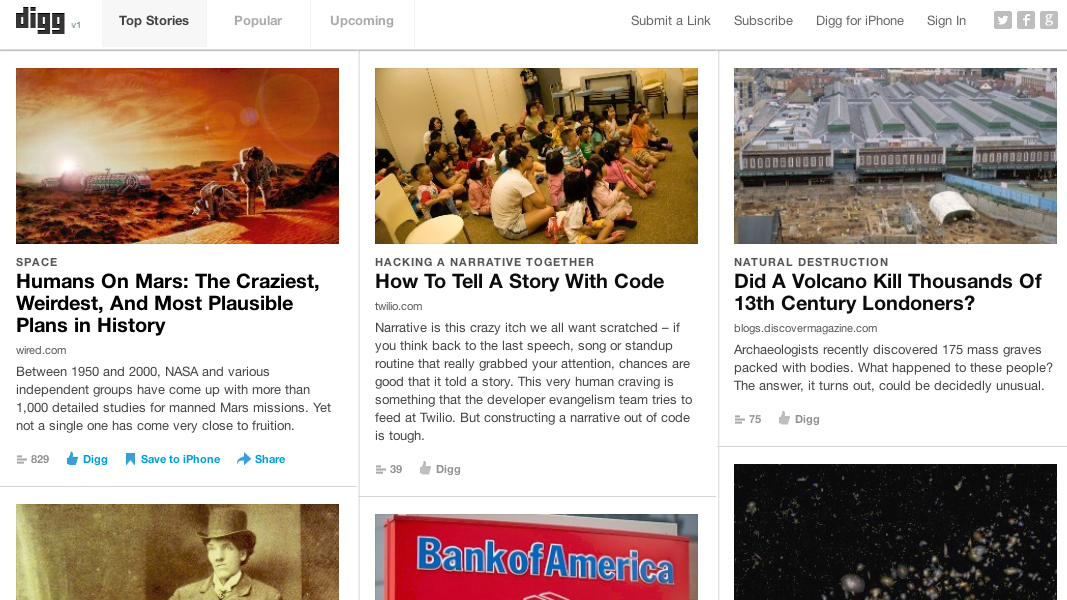Whatever happened to Digg?
Digg went from hero to zero - and other big-name sites could do the same

Digg.com was one of the great internet success stories, a site so popular that when it pointed its users at your website, your servers would explode.
By 2010 it was riding high - and then it started to fall, fast.
Visitor numbers went into steep decline, and the "Digg Effect" no longer made websites fall over. Earlier this year Digg was sold for a fraction of its former value: the site that was once valued at $175 million sold for just half a million dollars.
Digg lives on - it relaunched in August after a frantic from-scratch rebuild - but it's Digg in name only. The Digg we knew and loved is gone.
What went wrong?

Look-a-Likes
By 2010, Digg was under attack on multiple fronts. The Digg button, which enabled users to submit a site to Digg, got company: Facebook's Like button, which went live in April 2010 and was on 350,000 sites by September. Meanwhile the rival social news site Reddit was experiencing explosive growth - in January its pageviews were 250 million, and by the end of the year that figure would hit 829 million - and Twitter was already handling 65 million Tweets per day. Changes to Google's algorithm in 2010, which made Digg links less valuable, didn't help either.
Faced with declining traffic, Digg blew it. Digg v4, a massive redesign of the site that went live in August 2010, was a failure, hated by users and widely criticised. As Kevin Rose recalled this month - with some irony - in a video response to Reddit questioners, "We were really trying to play catch-up... Digg v4 was trying to rethink Digg, trying to get more of the mainstream news readers."
Get daily insight, inspiration and deals in your inbox
Sign up for breaking news, reviews, opinion, top tech deals, and more.
Drew Curtis, creator of the enormously successful not-news site Fark.com, remembers it vividly. "Digg scrapped the existing site, replaced it with a completely different site, then insisted that the new site was an improvement over the old," he told us. "It wasn't a redesign, it was a total replacement. People are willing to put up with a lot of extreme site redesign, a la Facebook, but they're unwilling to be lied to." It wasn't a deliberate lie, he stresses, but what Digg said it was doing and what its loyal users though it was doing were clearly very different.
The redesign wasn't the only problem. "The concept was broken," Curtis says, recalling that it was explained to him like this: "I would create a Fark account on Digg, upload my content to a Digg Fark page, people on Digg would read the content, and then miraculously we'd get traffic." That clearly wouldn't work for Fark, which is all about the links, but it probably wouldn't work for other publishers either. "Consider how the New York Times would view this: they were supposed to upload their articles onto Digg, people would then read them on Digg, and Step 3, traffic!"
Curtis wasn't impressed. "It was pretty clear that one, the redesign was going to drive off Digg's community, and two, the content sites it was aimed at weren't going to use it either."
And that's exactly how it panned out.
Bad for the internet
Many of Digg's problems were apparent in its ill-fated DiggBar, which launched in 2009 and was finally killed in April 2010. The bar was sold as a URL shortener, but framed other people's websites - that is, whenever you visited a page, you'd remain on Digg with their site appearing inside the window.
As Daring Fireball's John Gruber put it: "When you call it 'framing someone else's site', everyone agrees it's bullshit. When you call it 'The DiggBar', it's Web 3.5 Awesome." Most people hated it, even inside Digg: as Rose explained in his video response, "I knew internally that this was a horrible idea... it was bad for the internet."
Writer, broadcaster, musician and kitchen gadget obsessive Carrie Marshall has been writing about tech since 1998, contributing sage advice and odd opinions to all kinds of magazines and websites as well as writing more than a dozen books. Her memoir, Carrie Kills A Man, is on sale now and her next book, about pop music, is out in 2025. She is the singer in Glaswegian rock band Unquiet Mind.
